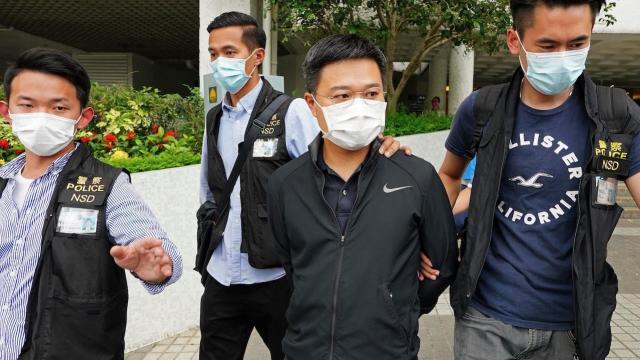Hong Kong police raided the offices of pro-democracy newspaper Apple Daily on Thursday, arresting five executives and seizing 38 computers, according to a new report from the news outlet itself. Police warned the public against sharing specific articles from the newspaper online without actually saying which articles were problematic.
Hong Kong police superintendent Steve Li said there were about 30 articles in Apple Daily, published in both Chinese and English, that violated Hong Kong’s new National Security Law, a draconian measure imposed by Beijing that’s being used to stifle dissent in the semi-autonomous region.
Li alleges the articles in question asked other countries to impose sanctions against Hong Kong as well as mainland China, but he failed to specify which articles he’s talking about.
“We have very strong evidence that the questionable articles play a very crucial part for the conspiracy which provide the ammunition for the foreign countries and the institutions or organisations to impose the sanctions to Hong Kong and the People’s Republic of China,” superintendent Li said at a press conference on Thursday, according to video published by the Hong Kong Free Press.
Li also suggested Hong Kongers could get in trouble for sharing the articles — which he, again, didn’t specifically identify — and said people shouldn’t “attract suspicion” by sharing them.
Apple Daily identified the five executives who were arrested as CEO Cheung Kim-hung, COO Royston Chow, editor-in-chief Ryan Law, associate publisher Chan Pui-man and platform director of Apple Daily’s digital operations Cheung Chi-wai. Founder Jimmy Lai was already arrested back in December of 2020 and was convicted of “unauthorised assembly” related to pro-democracy protests. Hong Kong police has reportedly seized Apple Daily’s assets, which amount to roughly $US2.3 ($3) million in equivalent U.S. currency, according to the newspaper.
Apple Daily notes that “hundreds” of officers took part in the raid, while other newspapers estimate there were roughly 500 Hong Kong police on hand, doing everything from shuffling papers to looking through the computers of reporters.
Any staff at Apple Daily who tried to enter the building during the search were thoroughly screened and then not allowed to visit their desks. Journalists were reportedly prohibited from livestreaming the raid, something that Apple Daily staff actually did during the newspaper’s last raid in August of 2020, shortly after the National Security Law was first passed.
Hong Kong has operated under a semi-autonomous “one country, two systems” regime since the territory was handed over by the British to China in 1997. But that autonomy has been under attack in recent years, with some of the most anti-democratic pushes coming very recently.
As just one example, Hong Kong’s once-thriving film industry now must adhere to strict censorship akin to what happens in mainland China, according to new government guidance published last week.
Hong Kong’s Secretary for Security John Lee told reporters at a news conference after the raid that those who’ve been arrested at Apple Daily should be shunned.
“Ordinary journalists are different, and should not get involved with them, keep a distance from them,” Lee said, according to the Hong Kong Free Press. “I hereby solemnly declare that: don’t associate with these criminals endangering national security, you will pay a hefty price if [you] stand with these criminals, [you] should cut ties with these criminals before it’s too late to repent.”
Apple Daily published a new article after the raid pledging to continue its work, and condemning the “blatant violation of press freedom.”
“As difficult as the current circumstances may be, we will carry on with our jobs with the aim to publish our papers as normal tomorrow,” the paper’s union said in a statement.
